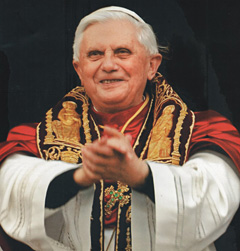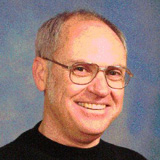
|
 |
 |
 Editorials | Opinions | May 2008 Editorials | Opinions | May 2008  
The Pope and Illegal Immigration
 Domenico Maceri - PVNN Domenico Maceri - PVNN


| | When the Catholic Church takes the defense of undocumented workers it does exactly that which Jesus would have done and can only emerge victorious. | | |
I don't care if you're infallible or not. It's bad manners. That's how Lou Dobbs described Pope Benedict XVI during the Pontiff's recent visit to the United States. Dobbs, the anchor of Lou Dobbs Tonight on CNN, said these words with a sarcastic tone that added to denounce the comments of the Pope on immigration.

In the course of his visit to the United States the Pope spoke about the importance of dealing with immigrants humanely. He did not distinguish between legal and illegal immigrants and naturally the words of the Pontiff were interpreted as including both groups.

That's how Dobbs interpreted them. According to him, the Pope had crossed the line and stepped into a controversial political question. The comments of the Pope were general and reflected the importance of maintaining united families, without regards to legal residence.

For many years Dobbs has been leading a campaign against undocumented workers on television. He often speaks about "broken borders," to emphasize the ease with which undocumented workers from Mexico enter the United States. Moreover Dobbs often inveighs against the American government for its inability to control the border with Mexico.

The Pope's comment did not have anything to do with politics and simply aimed to support poor people, reflecting thus the traditional role of the Church. In America the Church has manifested this role in its support of immigrants.

While in the past Catholic immigrants came mainly from Ireland, Italy, Poland and other countries, in the last several decades the majority of new Catholics have been coming in from Latin America.

The number of Catholics who have integrated into American mainstream keeps increasing. Assimilation has meant also moving away from the Church. However, the Church continues to thrive because of immigration.

Latinos already represent 39% of all the Catholics in America, that is to say 25 of the 65 million faithful. But from 1960 Latinos represent 71% of the new Catholics. The increase is obviously due to strong immigration. Today 40% of Latinos, illegal and not, were born outside the United States.

The Catholic Church does not distinguish between legal and undocumented faithful. American bishops, in fact, have opposed harsh legislation aimed at undocumented immigrants. The Pope thus legitimized the work done by the Catholic hierarchy in the U.S. with his comments.

This position is of course antithetical to the "crusade" Dobbs has been conducting against undocumented workers. This campaign against undocumented workers has not come about without effects. The emphasis on illegal immigration as a serious complication and identification almost exclusively as a problem of Mexicans or Hispanics has generated an increase of hate crimes.

Attacks caused by hate against Hispanics went up 35% in the period between 2003 and 2006, according to the FBI.

Some politicians inevitably have tried to use illegal immigration for their ambitions. The more obvious example is Tom Tancredo, the conservative man from Colorado. Tancredo has become the champion of the anti-illegal immigration crusade and was a candidate for the presidency of the United States. Unable to muster much support, he has been forced to abandon the race.

Nevertheless Tancredo continues his campaign against undocumented immigrants. The Italian-American man has said recently that the Pontiff's comments are aimed at finding "new members for his Church instead of preaching the Gospel."

Tancredo is mistaken. When the Catholic Church takes the defense of undocumented workers it does exactly that which Jesus would have done and can only emerge victorious. That's why in spite of some ideological differences with the Church, American Catholics continue to support it.

Even former Catholics stand with the Pope when they see he supports justice, recognizing in these actions the reflection of Jesus who continues to remain an integral part of their lives.
 Domenico Maceri, PhD, UC Santa Barbara, teaches foreign languages at Allan Hancock College in Santa Maria, CA. He is the author of a book on Pirandello, one on Spanish grammar, and another on Italian grammar. He has also published a number of articles in newspapers and magazines around the world, some of which have won awards from the National Association of Hispanic Publications. Domenico Maceri, PhD, UC Santa Barbara, teaches foreign languages at Allan Hancock College in Santa Maria, CA. He is the author of a book on Pirandello, one on Spanish grammar, and another on Italian grammar. He has also published a number of articles in newspapers and magazines around the world, some of which have won awards from the National Association of Hispanic Publications.

Click HERE for more articles by Domenico Maceri. | 
 | |
 |



